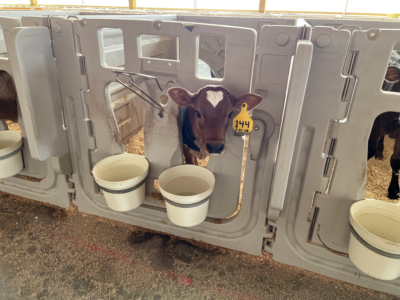Step into the world of cow housing!
Our dairy farmers take the utmost pride in caring for their animals which starts with providing the best housing options available. Following these practices helps ensure the health and safety of all animals throughout every stage of their life, making sure cows feel content and secure.
That starts well before calves are born with clean and comfortable places for expectant mother cows to live. These clean conditions protect mom and baby from harmful bacteria and other risks.
After birth, the new calf will begin its journey in its own hutch. Calf hutches are individual housing units that offer several benefits, including close monitoring and personalized care, minimizing disease transmission, providing a controlled environment, ensuring hygiene and cleanliness, precise nutrition management, and easier socialization and weaning.

Cow homes come in various shapes and sizes, providing our beloved bovine friends with cozy abodes and all the amenities a cow could dream of. From spacious free-stall barns where cows can lounge on soft bedding to seasonally open pastures where they can roam and graze freely, they are designed with one goal in mind: to make our moo-tiful cows as comfortable as possible.
- Free-stall Barns: Free-stall barns provide individual stalls where cows can rest, eat, and move freely. The stalls are bedded with clean, comfortable, and often recycled materials, such as sand, sawdust, or mattresses to help with cow comfort.
- Open-Lot or Pasture-Based Systems: Some dairy farms employ open-lot or pasture-based systems where cows have access to open (or sections of) pastures where they can graze and move around freely – giving them ample space for exercise and easy access to snacks.
- Compost-Bedded Barns: Compost-bedded barns are another housing system used by some farms. These barns feature a large, open area filled with a deep layer of organic bedding material, such as clean and separated manure, straw, and wood chips. Cows rest and move on the bedding, which composts over time, providing a comfortable and soft surface.

Some of the other strategies dairy farmers employ to maximize the well-being of their animals include:
- Adequate ventilation promotes good health among both animals and farm workers.
- Appropriate lighting and temperature control contribute to animal contentedness.
- Frequent removal of manure (two or more times per day) and changes of bedding materials promote proper animal hygiene and positive udder health.
- Keeping cows in a positive mood is essential for their milk-making efficiency. Farmers have implemented strategies to minimize stress, such as following routine schedules and reducing sources of fear. In fact, some farmers even place milking parlor machinery in quiet basement compartments and play calming music to keep our cows calm and content. By prioritizing their well-being, we ensure they produce the best milk possible.
- Prioritized flooring design and maintenance to prevent slips and falls and minimize injuries. Farmers use non-skid surfaces and sometimes incorporate cushioned materials to create secure and comfortable walkways.
It’s important to note that regardless of design, dairy farmers in Washington prioritize cow comfort, health, and welfare. They strive to provide clean and comfortable housing, ample access to food and water, and appropriate ventilation to maintain ideal cow conditions throughout the year that match local climate conditions. Farm-specific considerations, animal needs, and environmental factors contribute to determining the most suitable system for each farm.
